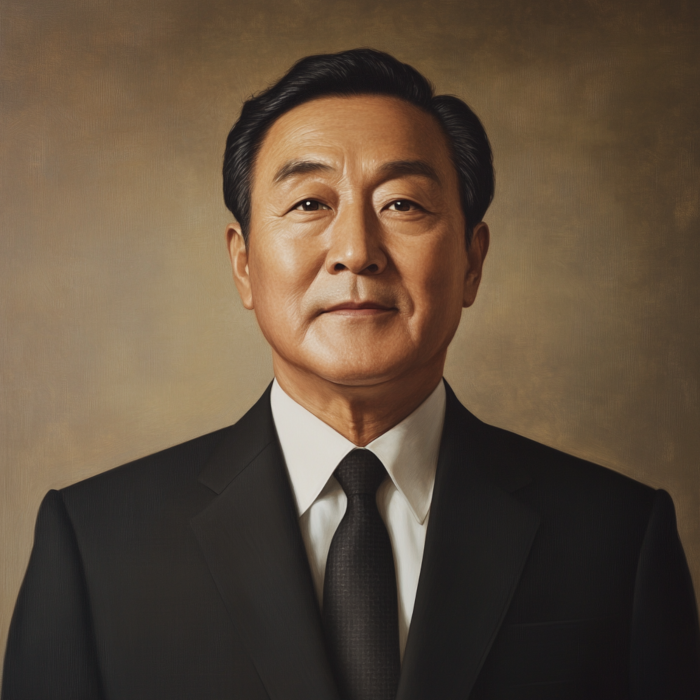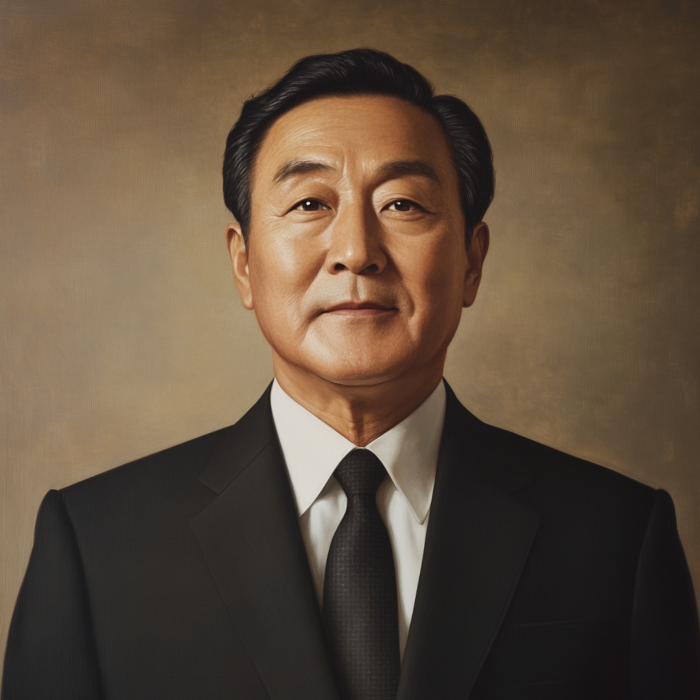


Kim Dae-jung (1924–2009) was a South Korean politician, democracy activist, and the 8th President of South Korea, serving from 1998 to 2003. He is best known for his tireless efforts in promoting democracy in South Korea during its years of authoritarian rule and for his "Sunshine Policy" of engagement with North Korea, which earned him the Nobel Peace Prize in 2000. Kim's life was marked by his transformation from political prisoner and exile to a revered statesman, advocating for peace, democracy, and human rights both domestically and internationally.
Birth and Family Background: Kim Dae-jung was born on December 3, 1924, in Haui-do, a small island in the southwestern part of Korea (now in South Jeolla Province). He was born during the period of Japanese occupation of Korea (1910–1945). His family, though not wealthy, was well-respected in the community. Growing up in rural Korea, Kim experienced both the oppression of colonial rule and the hardships of poverty.
Education and Early Career: Kim attended Mokpo Commercial High School and showed an early interest in politics. After World War II, when Korea was liberated from Japanese rule, Kim entered the shipping business and became a successful businessman in Mokpo. His business success allowed him to gain prominence in the local community, and he soon became involved in politics. He was elected to the South Korean National Assembly in 1961, but his term was cut short by a military coup led by Park Chung-hee, who would go on to establish an authoritarian regime.
Opposition to Military Rule: Kim Dae-jung became one of the leading voices of the opposition against the military dictatorship of Park Chung-hee, who ruled South Korea with an iron fist from 1961 until his assassination in 1979. Kim was a strong advocate for democracy, political reform, and human rights. His calls for democratic governance and criticism of Park’s regime made him a target of repression.
1971 Presidential Election: In 1971, Kim Dae-jung ran as the opposition candidate for president against Park Chung-hee in a highly contested election. Despite facing numerous obstacles, including harassment and electoral manipulation, Kim came close to defeating Park, winning an impressive 46% of the vote. His near-victory established him as the primary opposition leader and a significant threat to the regime.
Assassination Attempt and Abduction (1973): In 1973, Kim was kidnapped by South Korean intelligence agents while in exile in Japan. He was abducted from a hotel in Tokyo, blindfolded, and taken aboard a ship, where he was nearly killed. However, international pressure, particularly from the United States and Japan, led to his release. Kim credited his survival to the intervention of the U.S. government, and the incident became emblematic of the lengths the South Korean regime was willing to go to silence opposition.
Imprisonment and Death Sentence: In the aftermath of the 1979 assassination of Park Chung-hee, South Korea was again plunged into political turmoil. In 1980, after the Gwangju Uprising, a pro-democracy movement that was brutally suppressed by the military, Kim was arrested by the new military regime led by Chun Doo-hwan. He was sentenced to death for his alleged involvement in inciting the Gwangju protests. However, widespread international condemnation and pressure from global human rights organizations led to a commutation of his sentence, and Kim’s life was spared. He was later exiled to the United States, where he continued to advocate for democracy in South Korea.
Return to Politics and Democracy Movement: In 1985, Kim Dae-jung returned to South Korea and resumed his leadership of the pro-democracy movement. By this time, the political landscape in South Korea was changing, with growing calls for an end to military rule. Kim, along with his longtime political rival Kim Young-sam, became the faces of the democratic opposition. In 1987, after massive protests and public outcry, the military government agreed to democratic reforms, including direct presidential elections.
1987 Presidential Election: The first direct presidential election in decades was held in 1987, but the opposition’s chances were diminished by a split between Kim Dae-jung and Kim Young-sam, who both ran as separate candidates. Their division allowed Roh Tae-woo, the ruling party’s candidate and former general, to win the election. Despite the defeat, the election marked a significant step toward the restoration of democracy in South Korea.
Political Persistence: Kim Dae-jung continued to work within the political system, advocating for human rights, economic reform, and social justice. In the early 1990s, Kim briefly retired from politics, only to return a few years later. His persistence and dedication to democracy kept him at the forefront of South Korean politics throughout the 1990s.
Election as President (1997): After several failed attempts, Kim Dae-jung was elected president in December 1997, becoming the first opposition leader to assume the presidency in South Korea's history. His election was particularly significant because it marked the peaceful transfer of power from the ruling conservative establishment to a progressive government. Kim’s victory also came at a critical moment, as South Korea was facing the Asian financial crisis, which had severely weakened its economy.
Economic Reforms: One of Kim Dae-jung’s top priorities as president was to address the economic crisis. He implemented sweeping economic reforms aimed at restructuring the country’s financial institutions, improving corporate governance, and promoting transparency. His administration secured a massive bailout package from the International Monetary Fund (IMF), and through strict economic measures and reforms, South Korea was able to recover from the crisis. Under Kim's leadership, the country restored economic stability and growth.
"Sunshine Policy" and Engagement with North Korea: Kim Dae-jung’s most notable achievement as president was his Sunshine Policy, which sought to engage North Korea through diplomacy, economic assistance, and peaceful cooperation. The policy aimed to reduce tensions on the Korean Peninsula and promote reconciliation between the two Koreas. In June 2000, Kim held a historic summit with North Korean leader Kim Jong-il in Pyongyang, marking the first-ever meeting between the leaders of North and South Korea since the division of the peninsula in 1945.
The summit led to agreements on family reunifications, economic cooperation, and cultural exchanges. Kim’s efforts to ease tensions and promote peace earned him international recognition, and in 2000, he was awarded the Nobel Peace Prize for his work in advancing reconciliation and cooperation between the two Koreas.
Human Rights and Democracy: Throughout his presidency, Kim Dae-jung remained committed to promoting human rights, social welfare, and political reform. His government worked to strengthen South Korea’s democratic institutions and address issues such as labor rights, gender equality, and social justice. His presidency was seen as a period of expanded freedoms, with efforts to foster greater political participation and civil liberties.
Economic Struggles and Unemployment: While Kim Dae-jung’s economic reforms helped stabilize South Korea's economy, the restructuring process also led to significant challenges, particularly in terms of rising unemployment and labor unrest. His government faced criticism for the social impact of the IMF-imposed austerity measures, which included corporate layoffs and wage reductions.
Sunshine Policy Criticism: Although Kim’s Sunshine Policy was widely praised internationally, it faced criticism domestically. Some conservatives argued that the policy was too conciliatory toward North Korea and failed to address the North's human rights violations and military provocations. The policy’s long-term effectiveness was also questioned, especially as tensions between North and South Korea resurfaced in subsequent years.
Post-Presidency: After leaving office in 2003, Kim Dae-jung remained an influential figure in South Korean politics and international affairs. He continued to speak out on issues such as peace on the Korean Peninsula, democracy, and human rights. Despite his retirement from politics, he remained deeply respected both at home and abroad for his contributions to South Korea’s democratic development.
Death and National Mourning: Kim Dae-jung died on August 18, 2009, at the age of 85, due to complications from pneumonia. His death prompted a national outpouring of grief, and he was given a state funeral, an honor reserved for the most respected leaders of the nation. Leaders from around the world, including former U.S. President Bill Clinton, paid tribute to Kim’s legacy as a champion of democracy and peace.
Legacy: Kim Dae-jung is remembered as one of South Korea’s greatest statesmen, a symbol of resilience, courage, and the fight for democracy. His lifelong struggle for freedom and human rights, his leadership in bringing South Korea through economic crisis, and his efforts to promote peace on the Korean Peninsula have cemented his place as a pivotal figure in modern Korean history. His Sunshine Policy, though debated, opened doors to inter-Korean dialogue that had been closed for decades, and his Nobel Peace Prize serves as a testament to his dedication to peace and diplomacy.
Democratic Icon: Kim’s transformation from political prisoner to president serves as a powerful narrative of the triumph of democracy over dictatorship. His advocacy for human rights and justice continues to inspire democracy activists worldwide. His personal philosophy, often called the "Kim Dae-jung Doctrine," emphasized reconciliation, engagement, and cooperation, particularly in the context of inter-Korean relations.
Kim Dae-jung’s life was defined by his unwavering commitment to democracy, human rights, and peace. From his days as a political dissident under South Korea’s authoritarian regimes to his election as president and his groundbreaking Sunshine Policy toward North Korea, Kim played a transformative role in shaping South Korea's modern political landscape. His legacy as a Nobel Peace Prize laureate, a champion of democracy, and a symbol of resistance against tyranny continues to resonate in South Korea and around the world. Kim Dae-jung's story is one of hope, perseverance, and the belief that peaceful change is possible even in the face of oppression.

We use cookies
We use cookies and other tracking technologies to improve your browsing experience on our website, to show you personalized content and targeted ads, to analyze our website traffic, and to understand where our visitors are coming from. Privacy Policy.